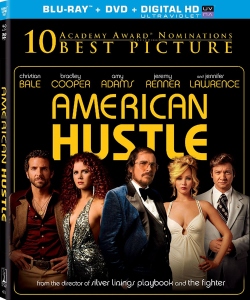“American Hustle” starts by showing Christian Bale’s combover — understatedly termed “elaborate” by Amy Adams. It’s a perfect lead-in for a movie about a con-man and –woman (Bale and Adams), a corrupt politician (Jeremy Renner), an FBI agent (Bradley Cooper) who’s not above using entrapment, and Bale’s young wife (Jennifer Lawrence) who’s not above using their kid for leverage. These are all bad people, but they are oh-so-humanly flawed that they’re actually kind of pathetically lovable.
I’m not a big fan of director David O. Russell’s work; while his premises are often good, I find his films ultimately rote and predictable. But this is my favorite of his works; for one thing, the 1970s style is slathered on like hair gel. Cooper’s curls are as time-consuming as Bale’s combover, Adams’ barely-staying-in-place dresses almost steal scenes, and I love the matter-of-fact addition of Renner gifting new friend Bale with a cutting-edge piece of technology in 1978: A microwave (or “science oven,” if you will). “American Hustle” is a luscious movie that mostly succeeds in transporting a viewer to the ’70s.
For a second thing, it has a complex plot that’s easy to follow yet also has room for one big surprise. “American Hustle” brings us into a world where con games are increasingly profitable for not only con-men but also for politicians and power-hungry government agents. They’re all oddly sympathetic because we’re forced to ask “How could they not be con-men and manipulators when they’re that good at it (and not so good at anything else)?” Of course, the movie doesn’t provide much of a basis for comparison to actual good people.
As such (spoiler alert), audiences might feel sympathy for Renner when he gets entrapped, and Bale when he confesses the con to his new friend; it’s the classic long-con conundrum: What if you grow to like the person you’re screwing over? Renner is a mayor who uses his assistant to take the bribes on his behalf, but as far as scumbag politicians go, he’s a good one. After all, he only pursues schemes that he thinks are good for his constituents (in this case, a deal that will bring a casino chain to his New Jersey city). Bale is a criminal, yes, but also a small businessman, and thus worth rooting for within “American Hustle’s” intriguingly stylized narrow context. Heck, even Cooper and Lawrence are largely swept along by the vagaries of love.
The performances are great throughout. Cooper and Lawrence starred together a year ago in Russell’s “Silver Linings Playbook,” but that’s not a distraction; they don’t share many scenes here and they are decidedly different characters. All of the leads show remarkable range compared to past roles they’ve played, and Lawrence might be the most impressive because she convincingly plays about 10 years older than her actual age. It’s fun to look for the supporting turns too, such as “Angel” and “Law & Order” veteran Elisabeth Rohm disappearing into her role as the mayor’s wife.

I hope no one falls for the con that anyone in “American Hustle” (except maybe the little kid) is a good person. But it’s fun, and enlightening, to live in their world for a couple hours.

